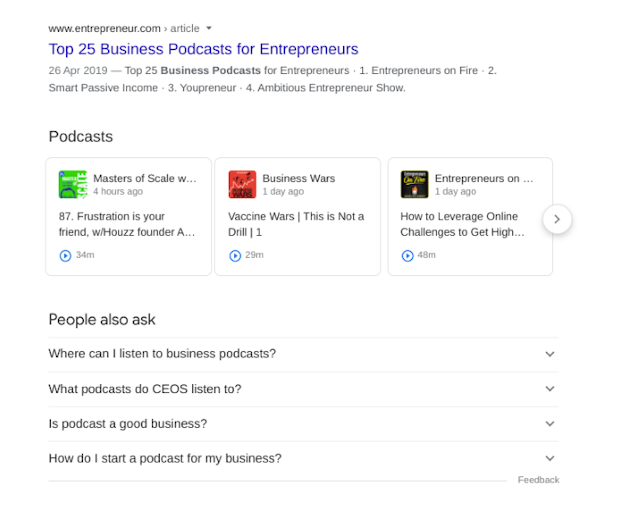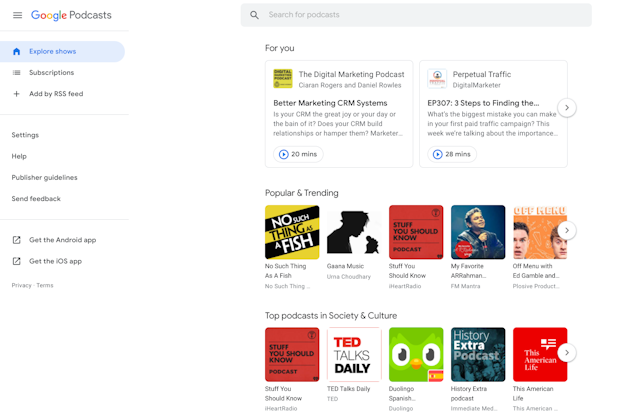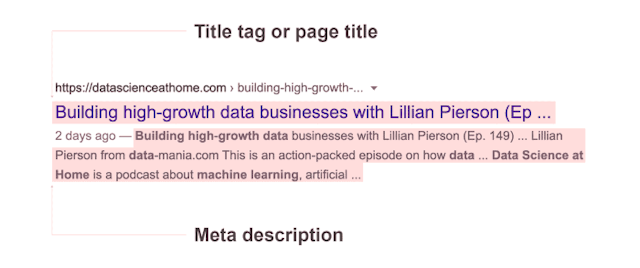Five ways to improve your podcast SEO
Demand for podcasts is growing steadily every year as more people turn to informative audio content. In 2019, fewer than nine million people in the UK were regularly listening to podcasts, but this figure more than doubled by 2020 with 15.61 million people regularly tuning in – and almost 20 million expected to be regular listeners by 2024.

Vertical Leap provides tips on how to make your podcast stand out
Now the likes of Google, Apple and Spotify are investing big in podcast platforms and a growing number of brands are using the medium to build new audiences. In this article, we look at five podcast SEO tactics that you can use to maximize visibility and grow listener numbers.
1) Optimize for podcast searches
Podcast searches take place across two key platforms: search engines and dedicated podcast discovery platforms like Spotify and Apple Podcasts.
Google happens to be among the biggest players in both of these fields, with the world’s number one search engine and its own dedicated podcast platform Google Podcasts. Best of all, Google shows podcast content in the organic SERPs for relevant searches, so people looking for things like ‘business podcasts’ may see something like this:

This is ideal for head term keywords involving the primary subject covered in your podcast content. To get your episodes ranking in Google Search, you need to claim your podcast on Google Podcasts Manager, which makes you discoverable in both Google Search and Google Podcasts.

To maximize visibility, you’ll also want to get your podcast featured on Spotify, Apple Podcasts and any other discovery apps you identify.
2) Own the home of your podcast content
While there are plenty of podcast apps to connect you with listeners, the real home of your audio content should be on your website. At the very least, you want to create a new category on your blog for podcast episodes but you may also consider creating a new subdomain, such as podcastname.yoursite.com, if you want to create a branded homepage for your podcast content.
Having a dedicated home for your podcast content helps with link building (which we’ll discuss in more detail shortly) but, more importantly, you want to publish each episode on your website because these episode pages are the most important asset in your podcast SEO strategy.
These pages allow you to rank individual episodes for longtail keywords instead of simply targeting head terms.

You need to optimize these pages like any other and you also want to include text descriptions, transcripts and/or accompanying blog posts on each episode page. This way, you’re producing unique content search engines can crawl (and index), as well as a text summary or alternative for audiences who aren’t willing to listen to a full podcast (users may not realize they’re clicking through to a podcast).
You can also point internal links to your episode pages to give them a boost in organic search.
3) Repurpose your podcast content
By repurposing your podcast content into other formats (blog posts, data visualizations, video clips) you get more SEO leverage out of every episode. Repurposed content creates more internal links and creates multimedia coverage around every topic for different user situations and preferences.
Podcasts are great for listening to when people are on the commute or doing something else that requires hands-free content. But the same user might prefer to watch a video or read a blog post on the same topic in a different situation.
4) Win backlinks for your podcast pages
As we explain in our 10-step guide to podcast SEO, podcasts are an excellent content format for earning high-quality backlinks. Here are some of the top strategies you can use to win backlinks for your podcast pages:
-
Get expert guests on your podcasts to increase authority, win listeners from other audiences and give a wider pool of people reason to link to your episode (starting with the guest themselves).
-
Appear as guests on other podcasts as this generally wins a link back to your own podcast domain.
-
Be newsworthy by covering the latest developments in your niche, which relevant sites are likely to talk about and link to.
-
Offer unique insights that aren’t available elsewhere so that your episode stands out as a resource.
-
Promote your podcast to leading sites in your niche to make sure they’re aware of your content and give them reason to talk about it, for example ask them to review it in a blog post.
-
Reference other content producers in your episodes for stats and other perspectives to grab their attention and give them reason to talk about you too.
-
Engage with other podcasts to create back-and-forths (maybe even a little friendly beef) to get people talking and stoke up loyalty among respective audiences.
The radio talk show influence of podcasts makes this the ideal content format for featuring guests and networking with other producers in a way that opens up natural link-building opportunities.
Just make sure when you reference other content producers in your episode that they’re also mentioned on the episode page, any repurposed content and the occasional social post so they’re alerted in any citation software they’re using.
5) Get the video cameras out
Although podcasts are an audio format, you can open up a new world of content opportunities by recording episodes on camera too. YouTube has become a key platform for video podcasts and a great place to build an audience that’s not accessible on audio-only platforms.
By hosting episodes on YouTube, you’ve also got another ranking opportunity in Google Search through the Videos feed.
Video episodes are also perfect for cutting up into clips and highlights reels, which are useful for promoting on social media platforms. Video content tends to generate the highest engagement on social, whereas you’re limited to what you can do with audio-only content.
Marie Turner is SEO specialist at Vertical Leap.
Content by The Drum Network member:

Vertical Leap
We are an evidence-led search marketing agency that helps brands get found online, drive qualified traffic to their websites and increase conversions/sales.
To...

